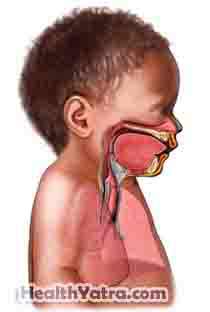Definition
Respiratory syncytial virus (RSV) is a common cause of many types of infections of the respiratory system. The term respiratory system refers to the lungs and breathing passages. These infections include:
- Common cold
- Bronchitis
- Bronchiolitis
- Pneumonia
- Croup
These infections are common. They are usually most severe in infants, young children, and older people. However, these infections can happen at any age. In severe cases, RSV infections can cause death.

Causes
RSV is spread through infected fluids in the mouth and nose. The virus most often enters the body from touching the mouth, nose, or eyes. It can also be spread by inhaling droplets from a sneeze or cough.
RSV is spreads easily. It can survive on surfaces and objects for hours. It is easily passed from person to person. Virus shedding usually lasts for 3-8 days, but may last for up to four weeks.
Risk Factors
Factors that may that increase your chance of getting RSV include:
- Age: infants and young children, especially those under 2 years old
- Exposure to a person infected with the virus or an object contaminated with the virus
- Premature birth of an infant
- Problems with the heart, lungs, or immune system
- Current or recent use of chemotherapy
- Previous organ or bone marrow transplant
- Problems associated with muscle weakness
Symptoms
The symptoms of RSV infection vary with age and previous exposure to RSV. Very young children, elderly people, and people with chronic diseases are more likely to have severe symptoms.
In children younger than three years old, RSV can cause illnesses such as bronchiolitis and pneumonia. Symptoms may include:
- Stuffy or runny nose
- High fever
- Severe cough
- Wheezing
- Shortness of breath
- Very fast rate of breathing
- Bluish color of the lips or fingernails
- Abnormal drowsiness or irritability
- Lack of appetite
- Discharge from the eyes
In children older than three years old, and healthy adults, RSV typically causes an upper respiratory infection or cold. Symptoms commonly include:
- Runny or stuffy nose
- Sore throat
- Mild cough
- Headache
- Low-grade fever
- Discharge from the eyes
Diagnosis
Your doctor will ask about you or your child’s symptoms and medical history. A physical exam will be done. A variety of tests are available to diagnose RSV. Lab tests called antigen detection assays are commonly done using secretions from the nose.
Treatment
In most cases, antibiotics are not needed because the infection is caused by a virus, not bacteria.
Mild Infections
Mild infections such as colds do not need special treatment. The goal is to ease the symptoms so that you or your child feels more comfortable while the body fights the virus. For symptom relief, try the following:
- Drink plenty of liquids, especially water and fruit juice, to help keep nasal fluid thin and easy to clear.
- Use a cool-mist vaporizer to humidify the air. This may help reduce coughing and soothe irritated breathing passages.
- Use salt water nose drops to loosen mucus in the nose.
- Use non-aspirin fever medicine, such as acetaminophen, as needed to reduce fever.
Severe Infections
People of all ages can develop severe infections from RSV. However, it is most common in very young people. Severe infections include pneumonia and bronchiolitis. These may require treatment in a hospital. This treatment is aimed at opening up breathing passages. It may include:
- Humidified air
- Supplemental oxygen
- Treatments to improve breathing
- In certain cases, mechanical ventilation may be used if you or your child is unable to breathe without assistance
If you or your child is diagnosed with RSV, follow your doctor’s instructions.
Prevention
Steps to prevent RSV include:
- Practice healthy habits, such as:
- Wash your hands often, especially after touching someone who may have a cold or other RSV infection.
- Avoid touching your face and rubbing your eyes.
- Do not share items such as cups, glasses, silverware, or towels with people who may have a cold or other RSV infection.
- Avoid smoke exposure.
- If your baby has a high risk of serious illness from RSV, your doctor may recommend a medicine to help prevent infection. The medicine is given by injection. It is injected monthly through the fall and winter in children under two years old. Talk with your doctor to see if this medicine would help your child.
